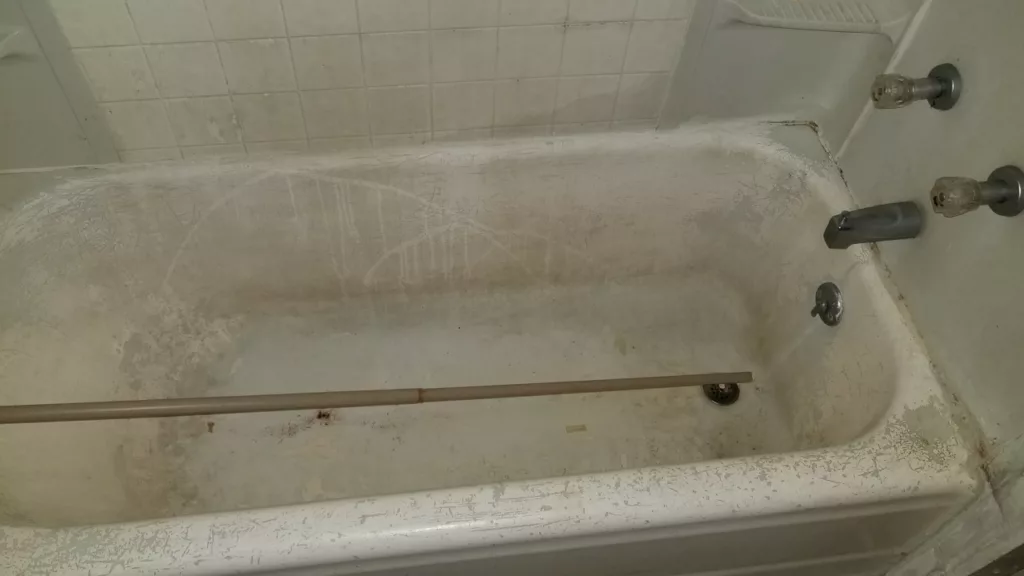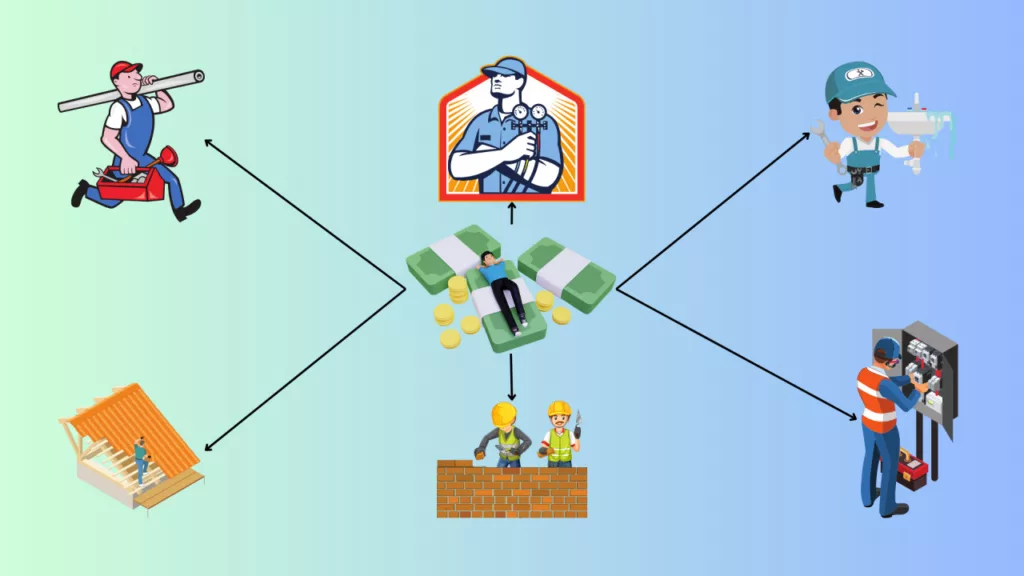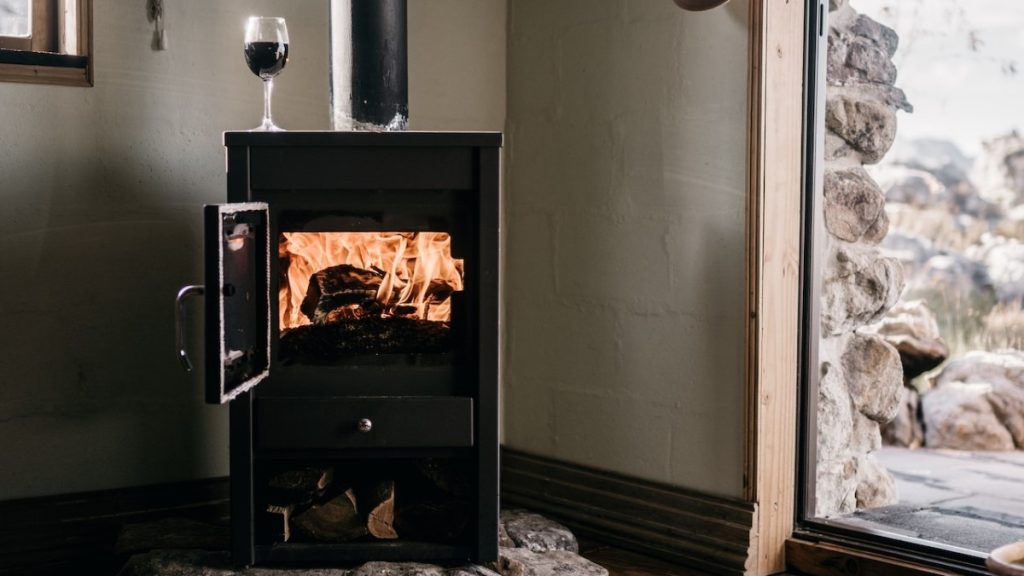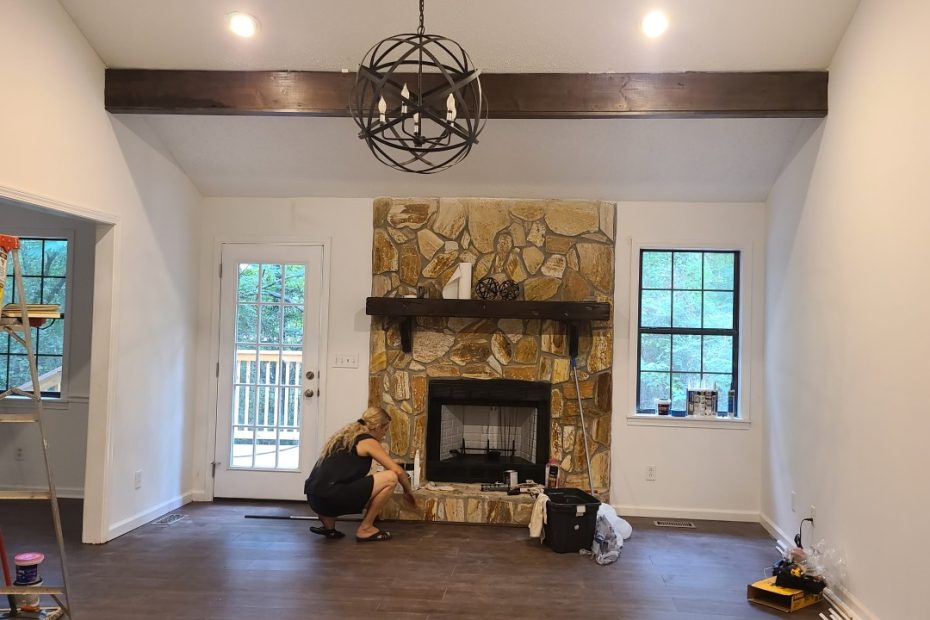If you own rental properties long enough, repairs will inevitably be needed. A new landlord will often face the dilemma of handling rental house repairs themselves or spending money on a professional. I am an actual landlord with over a decade of experience and over 70 rental properties, and I have faced that predicament numerous times. I have figured out the answer by trial and error, examining my data, and doing extensive research. I will share that answer with you, and I will explain the reasoning behind it.
You should not do rental property repairs yourself. Leave the maintenance work to professionals, even if you are very handy. You should not do this work yourself for countless reasons, even if you are a professional contractor.
I purchased my first three rental properties in 2007 with a partner. My partner is quite a craftsman, an electrical engineer who can build anything and even make furniture. Before closing, we were hyped about how much money we would save doing the work ourselves. Doing the work ourselves took up all of our free time and caused strains on our relationships.
We frequently went over budget because we did unnecessary work and didn’t stick to contractor-grade materials, as if we were fixing up our homes. The workload was taxing and strained our friendship. After those three houses, my partner never bought another rental, while I have purchased over 70 more and never lifted another hammer. This article will explain why it’s always best to hire someone to maintain your rental properties.
Are you able to do the work?

Many people are handy around the house but unsuitable to complete repairs in a professional setting. When handling a maintenance issue in your home, it’s okay to make several trips to home depot for supplies, but when you are in someone else’s home, you must be in and out quickly. Professional contractors have done these jobs hundreds of times and know most things that can pop up.
Professional contractors are prepared with the tools and materials to handle the job and tackle all but the most unusual surprises. Let a professional handle the work, and spend your time doing something you enjoy. If you are a professional contractor, you should still not handle rental house repairs yourself; read on to learn why.
If you can efficiently handle the job, do you know the housing codes? Following state laws and local housing regulations is essential to avoid a lawsuit. A DIY Landlord encountering a problem for the first time rarely knows the relevant rules and regulations. Fines from code violations can easily wipe out any savings on the cost of repairs.
Tenants will take advantage of you

Working at a tenant’s home gives them time to get to know you, and you never want to become friends with your tenants. It is vital that you keep the landlord-tenant relationship on a professional level.
After you hang out with a tenant for several hours or days, they get familiar with you, which makes it easier for them to ask for special favors such as a rent payment extension. Frequently, you give in and give them something they would never have asked for if you didn’t get to know them while replacing a light fixture. On the other hand, if you stand firm and turn down their request, this often leads to an awkward experience the next time you stop by for necessary repairs.
When doing minor repairs yourself, the extra face time with the tenant often leads to them asking you to do other work. You are there already, and you are so good at this that they ask you to fix their child’s bicycle chain (this happened to me). Or they want you to fix a normal wear and tear item that should be the tenant’s responsibility. These minor problems often go untracked but take up a significant amount of time,
Sometimes, it’s non-urgent repairs, like a loose doorknob, that they would never call about; but since you are here…
A professional contractor knows how to handle these types of tenant issues. Usually, the tenant will not ask them; when they do, they can tell them they are only authorized to complete specific repair requests.
You, as the landlord, should restrict your interaction with the tenant to only the landlord’s duties; don’t go to the house unless you absolutely have to. A simple maintenance request can lead to a full-time job.
Building a Network

At some point, you may not be able to do an emergency repair yourself, and you don’t know who to call. It’s a good idea to hire contractors for routine maintenance before the emergency pops up. This allows you to meet a variety of craftsmen while you have a reasonable time to evaluate them.
Throughout your real estate investing career, you will need unskilled laborers to handle mundane tasks, midlevel contractors to replace light fixtures, and professionals to service your HVAC unit. Knowing several workers in each category would be best, so you have multiple options. Start meeting these people early and build a network of reliable workers.
You Will Burn Out

You are probably saying, “Not me,” but you will eventually burn out if you do it long enough. It happened to my investing partner I mentioned above, and it’s happened to countless other real estate investors.
This burnout is not limited to the physical job itself. When a landlord is burned out, they cannot give their all to the business. This can lead to missed opportunities, poor decision-making, and financial losses.
You may love this type of work, but when it comes at an inconvenient time and it happens repeatedly, you will begin to dread it. In addition, the problems mentioned above will also add to your stress level, and you will likely abandon rental property investing as my first partner did. Hire contractors and remove complications from your life.
Responsiveness

Serious problems require immediate attention. They must be addressed quickly, or a minor issue could become a major problem. In addition, being slow to respond can upset the tenant and may violate the lease agreement.
Being a responsive landlord come with many benefits. It keeps tenants happy, stops problems from escalating, reduces tenant turnover, and lowers the vacancy rate.
A property manager must complete rental repairs in a reasonable amount of time. When the landlord is doing all the work, scheduling difficulties with multiple tenants increase the time to complete maintenance requests. When outsourcing the work to a contractor, the landlord can simply call multiple contractors.
Your Time Has Value

Landlords doing maintenance themselves will often fail to value their time. They think of saving the cost of the repair, but the lower repair costs only come from giving away their time for free.
To new rental property owners, it often sounds ridiculous to value your time. However, it’s essential to run your business efficiently. Giving up significant time for free to save on maintenance costs is rarely a good idea. The benefit of rental property is the passive rental income. The real estate investment is far from passive if the owner has to handle rental house repairs.
On top of this, business owners that do not value their time often lose focus on the most important task – running their business. They are constantly sidetracked by less important tasks, which leads to missed opportunities. Successful real estate investors put their focus on tasks that generate revenue and grow their businesses.
Licenses Are Needed

A license may be required to handle rental house repairs but is not needed when working on a primary residence. As a result, it may be legal for you to do a job in your own home, but to do it at a rental home may require a license.
A license is required to purchase the materials needed for air conditioning repairs in most areas. In addition, most electrical work and some plumbing work require licenses.
As a landlord, you could get the relevant license or keep up with which jobs require a license. However, professional contractors are the best way to avoid the license issue. This approach avoids the license issue and comes with all the benefits described in this article.
You Will Not be Able to Scale

Scaling your rental property business means growing that business by adding many properties over time. To expand the business, you must remove the roadblocks, and you will be a significant roadblock if all the maintenance work goes through you.
You may be able to handle one call a month, but you cannot keep up when you get multiple calls each day and have a vacant property to get ready. Your vacancies will increase, your tenants will be unhappy, and your life will be stressful. On top of this, you have curtailed your ability to add more properties.
Many landlords start by doing the work themselves, intending to hire contractors when they outgrow their ability. The drawback of this approach is that you end up evaluating contractors in a crunch when you have more work than you can handle.
Using the contractors all along is best, and then you simply make a phone call as you scale your business. Hopefully, you can rise to the point that you have an employee making that phone call. If you don’t handle rental house repairs yourself, your life will be easier. The easier you make the process, the greater your likelihood of success.
Conclusion
In this article, I discussed the importance of hiring a professional contractor to handle rental house repairs rather than attempting to do it yourself or relying on tenants to do it. It is important to utilize professional contractors with the expertise, tools, and materials to handle the job efficiently and safely. Additionally, I’ve highlighted the potential risks of doing repairs yourself, such as violating housing codes and the risk of tenants taking advantage of the situation to request unrelated work.
A landlord should maintain a professional relationship with tenants and restrict their interaction to only landlord duties. An excellent way to do that is by building a network of reliable workers for routine and emergency repairs. The easy way to create this network is by hiring contractors for routine maintenance, even before you need them.
There is no reason that you should handle rental house repairs yourself. If you have enough free time, you should find more rental houses or do something you enjoy. If you enjoy this work, remodel your home or take up woodworking.
If you are forced to do this work to save money, you paid too much for the rental house. Before you buy the property, make sure you understand what the true rental expenses will be and that rent payments will cover that cost. Remember the number 1 rule of investing in rental property: never pay too much for a rental house.




